- Recall that:
- A byte is a
memory cell consisting of
8 switches and
can store
a binary number
(See: click here )

- Although the computer stores
binary numbers,
we can interpret them
as decimal number through
a conversion operation:

- The computer can
combine adjacent bytes in
the RAM memory to form
larger memory cells

- Although
a computer memory
can only
store numbers,
we can use an
encoding scheme
to
represent
any kind of information
(E.g.: marital status information: 0 = single, 1 = married, and so on...
gender information: 0 = male, 1 = female) - We must have
context information to
interpret
a number that is stored in
the RAM memory
(E.g., we cannot interpret the number 0 stored in RAM memory unless we know kind of information it is.)
- A byte is a
memory cell consisting of
8 switches and
can store
a binary number
(See: click here )
- A Java computer program
uses variables to
store information
- There are different kinds
(types) of
variables
- In this webnote, we will study the floating point variables
- Variable in any programming language
- A variable in a
computer program is in fact
one or more memory cells
These memory cells jointly store the encoding of a number
- A variable in a computer program stores a number
- Each variable
has a
data type
The data type allows the computer program to use the appropriate encoding (interpretation) scheme to interpret the number stored in the variable
- A variable in a
computer program is in fact
one or more memory cells
- Analogy of a variable
- A variable
(in Computer Science) is like
a piece of paper
with a tag attached to it.

- The tag represents the
data type of the variable
(the value of the tag cannot be changed)
- You can only write
one (binary) number on the piece of paper.
- You can erase the number and write a new number on the paper; but you can never write more than one number on the paper at any time.
- A variable
(in Computer Science) is like
a piece of paper
with a tag attached to it.
- A floating point number is a
number where the
number of decimal digits before
and after the decimal point
is not fixed
(i.e., the decimal point "floats")
-
Examples:
1234.5 1 decimal digits after the decimal point 0.087 3 decimal digits after the decimal point 3.1415 5 decimal digits after the decimal point
- Floating point numbers can also be written
in the exponent form:
0.31415e1 (= 0.31415×101 = 3.1415) 31.415e-1 (= 31.415×10-1 = 3.1415)
- A peek into CS255 (Computer Architecture) material:
- A floating point number is
in fact represented by 2 numbers:
- A mantissa (e.g., the 0.31415 in 0.31415e1)
- An exponent (e.g., the 1 in 0.31415e1)
The floating point number representation will be discussed in detail in the CS255 course.
- A floating point number is
in fact represented by 2 numbers:
- There are 2 kinds of
floating point variables
in Java
We will discuss the double precision kind first.
(We discuss double precision floating point variable first to avoid using the casting operation - casting will be explained later)
- A double precision
floating point variable is
a variable that:
- uses 8 consecutive bytes of
memory as a single 64 bit memory cell
- uses a modified
binary number system
as encoding scheme
- For more details on the floating point encoding method, please take CS255
- A double precision floating point variable
can represent a floating point number:
- in
range of from
−10308
to 10308
- and with about 15 decimal digits accuracy
- in
range of from
−10308
to 10308
This kind of variable is commonly used in scientific computations.
A calculator uses double precision floating point variables.
- uses 8 consecutive bytes of
memory as a single 64 bit memory cell
- Important fact:
- A floating point variable
behaves like a piece of paper
where you can record
(exactly) one floating point number:

BTW, that's how you perceive a double typed variable.
Inside the computer, the number is represented with bits.
A double typed variable looks something like this in reality:

The 64 bits encodes a floating point number
The encoding method used is called the IEEE 754 Standard - See: click here
- A floating point variable
behaves like a piece of paper
where you can record
(exactly) one floating point number:
Note to lecturer:
- Teach "Defining floating variables" with 2 terminal windows
- window 1: edit a Java program
- window 2: compile and run
- Lecture while editing the Java program (from scratch)
|
|
- Every variable in Java
must be defined
-
This rule applies to a
floating point variable.
Also, you must use the correct syntax construct to write a variable definition
-
Syntax to define an
floating point variable:
double NameOfVariable ;Notes:
- The keyword double announces the variable definition clause
- The NameOfVariable is an identifier which is the name of the variable.
- The variable definition clause is must be ended with a semi-colon ";"
- Example:
public class Var01 { public static void main(String[] args) { double x; // Define floating point variable with name "x" System.out.println("Hello Class"); System.out.println(" The variable x contains this number:"); System.out.println(x); // Print variable "x" } }Notes:
- The name of the Java program
is Var01
Therefore, the UNIX filename that contain this Java program must be: Var01.java
- The statement
"System.out.println(x);"
will print
the content of the variable x
to the terminal
- Notice that the statement
"System.out.println(x);"
does not uses
quotes ".." around the
variable x
- The statement "System.out.println("x");" (with quotes ".." around x) will print the text x
- Notice that the statement
"System.out.println(x);"
does not uses
quotes ".." around the
variable x
- Remember that a double
variable is
like a piece of paper
(where you can write a
one floating point number)
The variable name is like writing that name in a corner of the paper (for identification purpose)
- The name of the Java program
is Var01
- When a Java program starts to run inside
the computer, it will
use up a portion of the
RAM memory to store various things
A (large) portion of the RAM memory will remain unused
- The effect of the
definition:
double x;
is the following:
- The computer will
find
8 consecutive bytes of
RAM memory that is
unused
- The computer will then
reserve
these memory bytes
- It also associate the
name x with
the (8 bytes of) reserved memory
- Whenever the Java program uses the name x, the computer will translate that into read/write operations to these (8 bytes of) reserved memory
- The computer can
store
(exactly) one floating point number
in the reserved memory bytes.
That is why:
- A floating point variable behaves like a piece of paper where you write down (exactly) one floating point number
- The computer will
find
8 consecutive bytes of
RAM memory that is
unused
- Example:
(draw these figures on black board -
show the progression)
- When the Java program is run,
it starts with the main()
method:
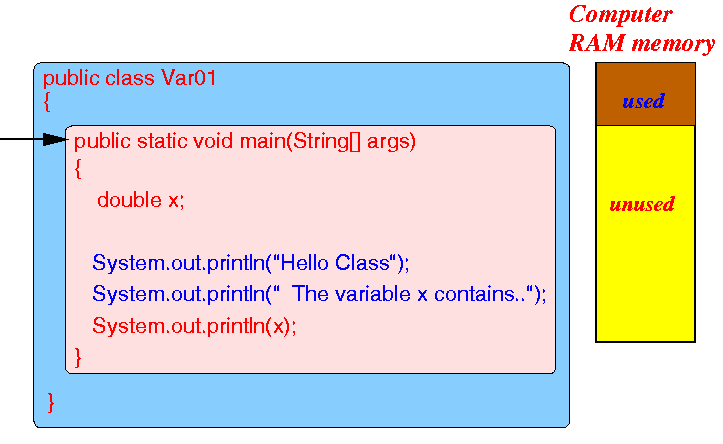
A portion of the RAM memory is used.
But a large portion will be unused
- When the variable definition
"double x"
is processed, it causes the computer to
reserve consecutive 8 bytes of RAM memory:
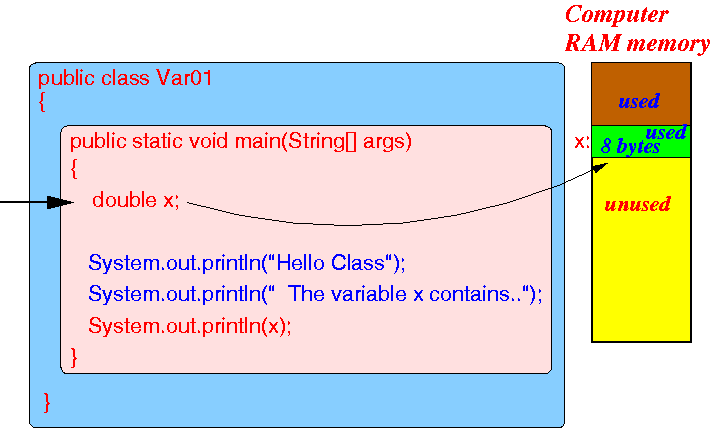
These 8 bytes of reserved memory can now be referred to by the name x !!!
(How this is done exactly will be explained in CS255)
- When the Java program is run,
it starts with the main()
method:
- Example Program:
(Demo above code)

- Prog file: click here
How to run the program:
- Right click on link and
save in a scratch directory
- To compile: javac Var01.java
- To run: it will not run due to an error...
Output: (Compile error)
Var01.java:11: variable x might not have been initialized System.out.println(x); // Print the content in variable "x" ^ 1 error
Meaning:
- The variable x
is "blank"
(i.e.,
has nothing "written" on it)
(Note: blank is not the same as contains the value 0)
- Computer Science Jargon:
- Creating a variable = reserve memory space for a variable
- Assignment statement:
- The assignment statement in the Java programming language instructs the computer to update the value stored in a variable
- Syntax of an assignment statement:
VariableName = Expression ;
Notes:
- The symbol "=" is called
the assignment operator in
Java
- The variable on left-hand-side of
the "=" operator is
the receiving variable
- The expression on
right-hand-side of
the "=" operator is
the value that
is assigned to the
receiving variable
- The assignment statement
must be ended with a
semi-colon ";"
- Meaning of
the assignment statement:
- The expression on the RHS of the "=" operator is first computed
- The computed value is then assigned to the receiving variable
- The symbol "=" is called
the assignment operator in
Java
- Example:
public class Var02 { public static void main(String[] args) { double x; // Define floating point variable with name "x" x = 0.31415e1; // Assign 3.1415 to x System.out.println("Hello Class"); System.out.println(" The variable x contains this number:"); System.out.println(x); // Print variable "x" } }Notes:
- The name of the Java program
is now Var02
Therefore, the UNIX filename that contain this Java program must be: Var02.java
(I will not make this comment anymore from this point on...)
- The name of the Java program
is now Var02
- Example:
- When the variable definition
"double x"
is processed, it causes the computer to
reserve consecutive 8 bytes of RAM memory:
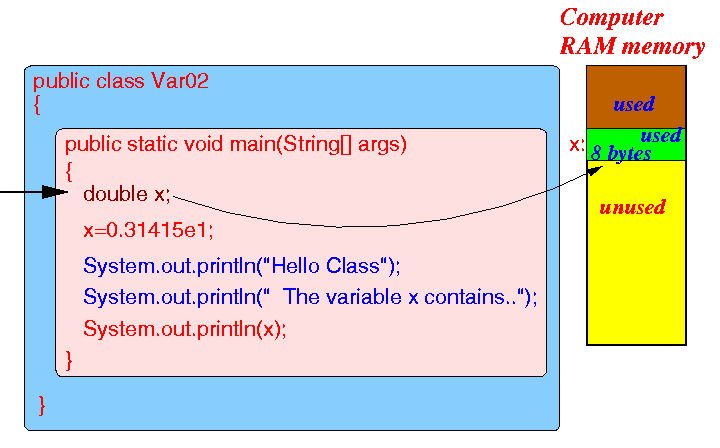
These 8 bytes of reserved memory can now be referred to by the name x !!!
- The assignment statement
x=0.31415e1 will
store the value
3.1415 into
the memory cell
identified by the name
x:
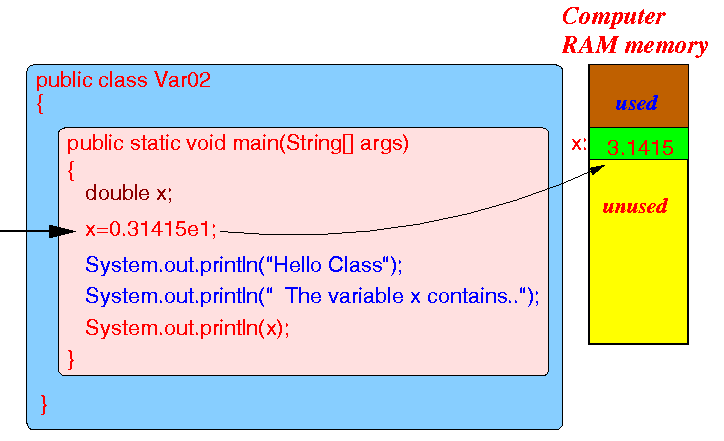
- The Print statement
System.out.println(x) will
read the
value stored at
the memory cell
identified by the name
x and
print it to the terminal:
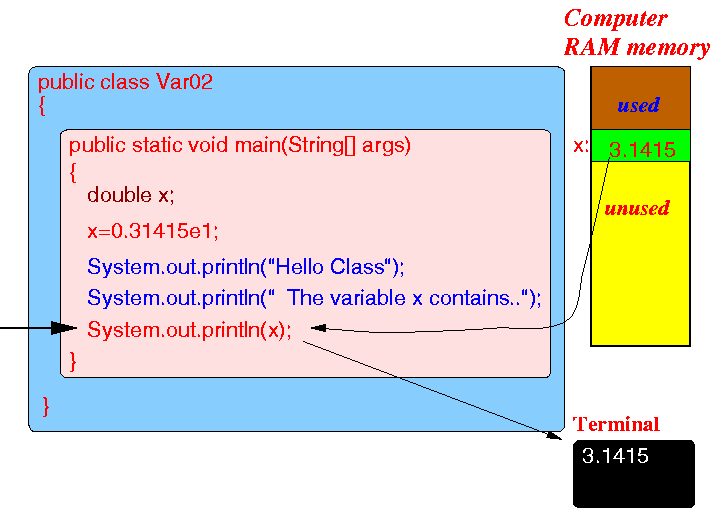
- When the variable definition
"double x"
is processed, it causes the computer to
reserve consecutive 8 bytes of RAM memory:
- Example Program:
(Demo above code)

- Prog file: click here
How to run the program:
- Right click on link and
save in a scratch directory
- To compile: javac Var02.java
- To run: java Var02
Output:
Hello Class The variable x contains this number: 3.1415
- When a variable is defined,
it does not contain a legitimate value
- You can give an initial value
to a variable when you
define the variable
- Syntax to define an
initialized double precision
floating point variable:
double varName = initialValue ;Example:
public class Var03 { public static void main(String[] args) { double x = 0.31415e1; // Define an initialized variable System.out.println("Hello Class"); System.out.println(" The variable x contains this number:"); System.out.println(x); // Print variable "x" } }
- You can define multiple variables
of the same type with
multiple clauses
Example: defining 3 variables
public class Var04 { public static void main(String[] args) { double x = 0.31415e1; // <----- Focus here double y; double z = 2.71828; y = 1.0; System.out.println(x); // Print variable "x" System.out.println(y); // Print variable "y" System.out.println(z); // Print variable "z" } }
- You can also define
multiple variables
of the same type with
one clauses by
separating the different variable names
with a
comma.
Example: defines that same 3 variables with 1 clause
public class Var04 { public static void main(String[] args) { double x = 0.31415e1, y, z = 2.71828; // <----- Focus here y = 1.0; System.out.println(x); // Print variable "x" System.out.println(y); // Print variable "y" System.out.println(z); // Print variable "z" } }Notice the comma (,) separating the variable names.